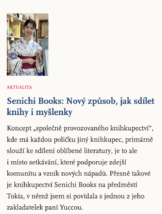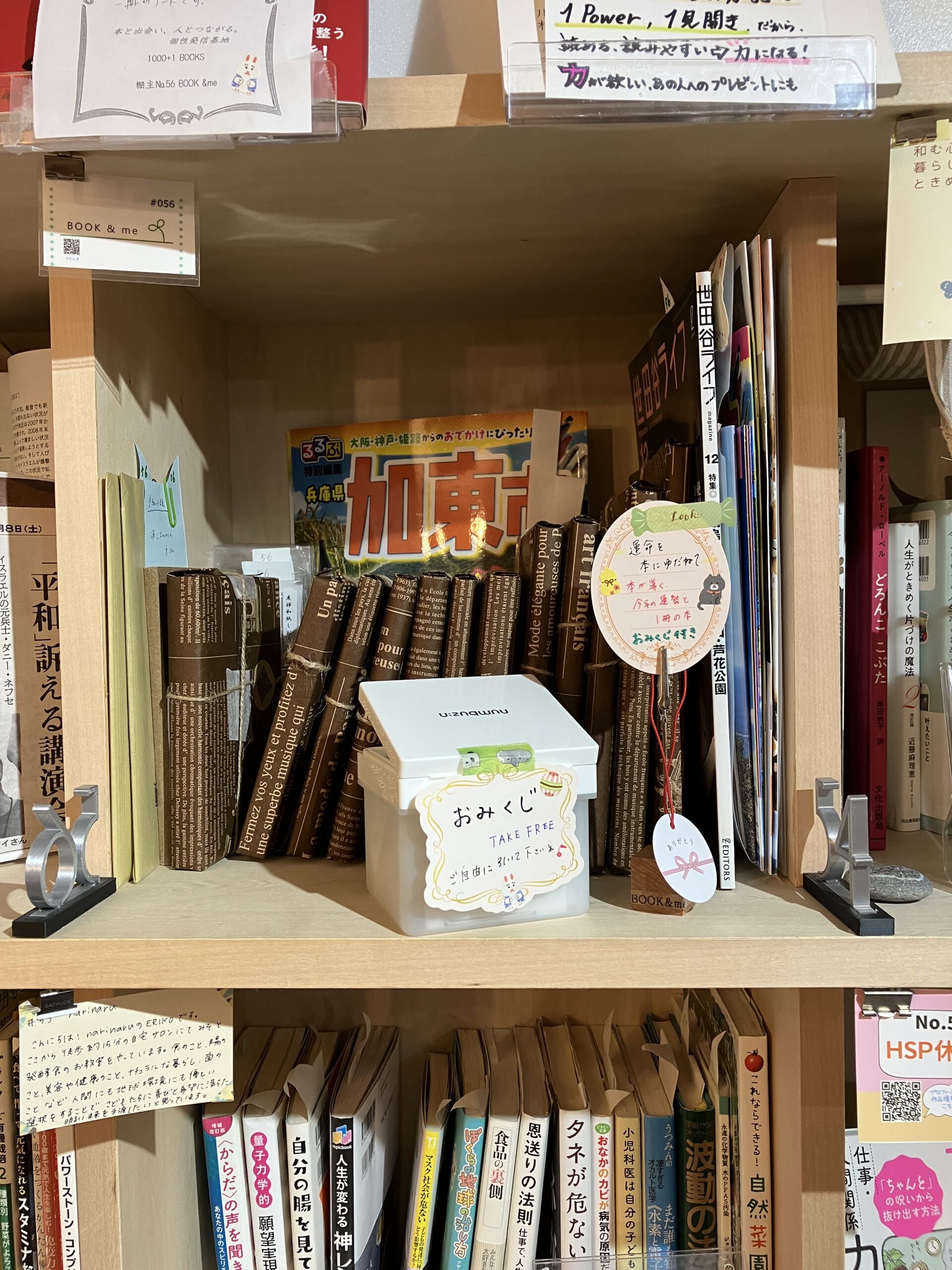iLi-Mobility プロジェクト「外国文学とその変化する世界の反映」(NPO – アーティストのステータス – 請求番号 4/2023 – モビリティ III / 0314、プロジェクト番号 0314000155 の支援による)のメンバーであるアンナ・エステル・ショトロヴァさんが #37 葉々舎の鯉沼さんが開く書道教室に参加されたことをきっかけにうけたインタビューが記事になりました。このプロジェクトはチェコ文化省、国家復興計画、欧州連合の財政支援を受けて実施されているもので、他にもフィンランド大使館などの支援をうけて来日されました。記事はそのプロジェクトの一環として作成されたものです。
オリジナルの記事はこちら↓
Senichi Books: Nový způsob, jak sdílet knihy i myšlenky 「Senichi Books: 本やアイデアを共有する新しい方法」
記事 日本語訳 (Google翻訳+Microsoft翻訳+DeepL翻訳)
Senichi Books: 本やアイデアを共有する新しい方法
各棚を異なる書店が担当する「共同運営書店」のコンセプトは、主にお気に入りの書籍を共有するために使用されますが、地域コミュニティや新しいアイデアの出現をサポートする出会いの場でもあります。東京郊外にあるセンイチブックスという書店はまさにこんな感じで、その創設者の一人、由佳さんと話をしました。
私は東京から電車で約20キロほど西にある調布市の仙川駅まで行きました。ここでは市の境界は区別できず、市街地が続いていますが、電車を降りても小さな町の雰囲気が残っています。高層ビルは2、3階建てのビルに取って代わられ、歩行者天国は慌ただしい人々でごった返していましたが、携帯電話やブリーフケースを手にしたネクタイ姿の男たちの不可解な群れではなく、子供連れの親たちや、カゴに買い物を入れた自転車に乗った老人たち、制服を着た小学生のグループ、あるいは近くのショップやカフェ、ファーストフード店を訪れる人たちでした。
私は仙川に、若くてエネルギッシュな日本人女性、鯉沼由佳さんの書道講座を受けに行きました。驚いたことに彼女は講座のために伝統的な日本の着物を着て、センイチブックス(1001Books)という看板のある家の1階*、本でいっぱいの部屋で私を出迎えてくれました。棚のほかに大きなテーブルと椅子がたくさんあり、さまざまなミーティングがここで行われていることがわかります。さらに小さな簡易キッチンも隣接していました。そこで私たちの会話は、由佳さん が運営する共同経営の書店、センイチブックス の話になりました。
*階数表記は英国式。日本では2階です。
iLiterature : ウェブサイトではセンイチブックスを「生協書店」と表現していますね。どのように機能するのか説明していただけますか?
鯉沼 由佳 : メインのアイデアは、できるだけ多くの人を本のサイクルに巻き込むことです。彼らに本と出会い、自分の小さな書店を運営し、読書への愛を深めるスペースを提供することです。私たちはそれが、コミュニティとともに成長し進化する、満足と幸福への道であると考えています。
iLiterature : それぞれが 32 x 32 cm の棚を持っていて、そこに好きな本を並べているということですね。本だけではないことに気づきました。
鯉沼 由佳:はい、みんなで棚を借りて、おすすめの本を並べています。そして、それを販売しており、センイチブックスは1冊につき100円という少額の手数料を請求しています。本だけでなく、本や読書に関わるハンドメイドのアイテムもご用意しています。例えば、筆文字のしおりを提供しています。書店さんは日替わりで来店しているので、いつも誰かがいます。日中はさまざまなイベントも開催されます。
iLiterature : センイチブックスのプロジェクトは、どのようにして生まれたのですか? 最初から具体的なビジョンはあったのですか?
鯉沼 由佳 : 私たちは、covid-19のパンデミックの最中に、人々が本を通じてアイデアを交換し、つながることができる場所を作りたいという思いから始めました。私と他の3人の友人がアイデアを思いつきました。当初はクラウドファンディングキャンペーンを開始し、そこから資金面での支援だけでなく、棚のレンタルに興味を持ってくださる方からも最初の申し込みをいただきました。
iLiterature : シェア書店の概念は日本では一般的ですか?
鯉沼 由佳:はい、共同書店はますます一般的になってきています。東京のブックマンション書店から始まり、そこからそのコンセプトが私たちを含めた他の書店にも取り入れられ、さらに広がりを見せています。コミュニティをサポートし、都市を活性化するこのコンセプトは、人々に愛されています。
iLiterature : センイチブックスは単なる本を売る場所ではないんですね。ここではどのようなイベントを企画していますか?
鯉沼 由佳:多くの棚オーナーの多くは、運営を担当する日にイベントを開催しています。例えば、工芸品制作のワークショップや非公式の相談会などです。結局のところ、私たち二人もここで出会ったのは書道がきっかけでした。著作家のオーナーの一人は、センイチブックスでの仕事中にお客様から寄せられた質問をもとに本を出版したこともあります。
iLiterature : センイチブックスの運営資金はどうやって調達しているのですか? 人々の熱意だけでうまくいくのでしょうか、それとも何か他のサポートがあるのでしょうか?
鯉沼 由佳: 私たちは金銭的な支援は受けていませんが、ぜひ受けたいと思っています。このプロジェクトは純粋に人々の情熱と決意によって動かされています。
iLiterature : それで、その人たちは誰ですか?子供や青少年は関与していますか?
鯉沼 由佳: はい、ここには9歳の子供からお年寄りまで、非常に多様な販売者がいます。その中には、ITスペシャリスト、翻訳者、独立したジャーナリスト、ブックデザイナー、教師、司書、地元のドルトン学園の生徒がいます。
iLiterature : 日本では、地下鉄やバスの中で多くの子供たちが本を読んでいることに気づきました。ヨーロッパでは、子供たちが電話を使用しているのをよく見かけます。なぜ日本の子供たちは読書を好むのだと思いますか。
鯉沼 由佳:それは面白いですね!私たちの国でも、多くの子供たちが携帯電話に釘付けになっています。しかし、私たちの教育システムは、読むこと、書くこと、そして紙の全体的な文化に重点を置いており、それが子供たちを本に近づけるのに役立っていると思います。それがまさに私たちがセンイチブックスを始めた理由です。大人がもっと本を読んで本に囲まれれば、子どももそれに倣うだろうと思いませんか。たとえば、私の15歳の息子は自分で絵本を作り、もうすぐ本棚に並べて販売する予定で、ちなみにそれを英語に翻訳する予定です。センイチブックスには創作の種がいっぱい!
iLiterature : 四角い棚はインスタグラムの投稿を印象的に思い出させます。センイチブックスは、同じ興味を持つ人々が出会うオフラインのソーシャル プラットフォームとして機能すると思いますか?
鯉沼 由佳 :はい、多くの棚オーナーがそのように認識しています。彼らは棚を飾り、注目を集め、素敵にしようとします。書店を非公式な会議の場として利用する人もいます。たとえば、非常に敏感な人(Highly Sensitive person)について執筆している著者は、ここで公開討論会を定期的に開催しています。
iLiterature :センイチブックスの今後の予定はありますか?何か大きなイベントはありますか?
鯉沼 由佳:はい!ここ仙川に34年間住んでいた有名な作家、安部公房の生誕100周年を記念して、棚のオーナーのグループが2024年9月29日に盛大な祝賀会を企画しています。すでに毎月読書会を開催しており、そこで彼の前衛的な作品を探求し、早稲田大学の鳥羽耕史教授が議論を主導しています。このイベントはメディアの注目を集め、国際的な側面を持っています。同様のイベントが 3 月に パリで開催されました。
iLiterature : それはすごいですね! 私が学んだところによると、センイチブックスは単なる本屋ではないようです。コミュニティにおけるその役割をどのようにお考えですか?
鯉沼 由佳 :センイチブックスは、物事をさまざまな角度から見て、新しいアイデアを生み出す、考えて成長する場所です。本を通じて知性と文化を育み、共有する場所です。そして何よりも、読書の魔法から生まれる無限のつながりと理解のための空間なのです。
© Anna-Ester Šotolová – 27. 9. 2024
google翻訳による英語訳
The concept of a “jointly operated bookstore”, where each shelf is occupied by a different bookseller, is primarily used to share favorite literature, but it is also a meeting place that supports the local community and the emergence of new ideas. This is exactly what the Senichi Books bookstore in the suburbs of Tokyo is like, where I had a chat with one of its founders, Ms. Yucca.
From Tokyo, I took the train to the Sengawa stop in the city of Chófu, which is located about twenty kilometers west. Although city boundaries are indistinguishable here and the built-up area is continuous, after getting off the train I still felt the atmosphere of a small town. So, small towns on a Japanese scale; skyscrapers were replaced by two- to three-story buildings, and the pedestrian zone was crowded with people in a hurry, but it was no longer an impenetrable crowd of tie-dyed men with mobile phones and briefcases in hand, but rather parents with children, elderly people on bicycles with shopping in their baskets, groups of schoolchildren in uniforms or visitors to nearby shops, cafes and fast food restaurants.
I went to Sengawa for a calligraphy course led by Júka Koinuma, a young and energetic Japanese woman – she dressed in a traditional Japanese kimono for the course. To my surprise, Júka welcomed me on the first floor* of a house with a signboard called Senichi Books (translated as One Thousand and One Books), in a room full of books. In addition to shelves, it is also equipped with a large table with many chairs, which suggests that various meetings take place here. An addition is an adjacent small kitchenette. So our conversation turned to Senichi Books, a jointly run bookstore, which Júka is behind. *The numbering of floors is the British way
iLiterature : So each of you has a 32 x 32 cm shelf and offers the books you like on it? I noticed that it’s not just books.
Júka Koinuma : Yes, everyone rents a shelf where they display recommended books. He then sells these, with Senichi Books charging a small commission of ¥100 per book sold. In addition to books, we can also offer handmade items that have something to do with books and reading; For example, I offer bookmarks with calligraphic characters. The booksellers take turns in their daily visits, so there is always someone there. Various events are also held here during the day.
iLiterature : Is the shared bookstore concept common in Japan?
Júka Koinuma : Yes, joint bookstores are becoming more and more common. It started with the Book Mansion bookstore in Tokyo, from them the concept was adopted by others including us and it is spreading further. People have loved the concept as it supports communities and revitalizes the city.
iLiterature : So Senichi Books is more than just a place to sell books. What events do you organize here?
Júka Koinuma : Many shelf owners hold events on the days they are responsible for operations. For example, workshops for the production of handicrafts or informal consultation meetings. After all, the two of us also met here because of calligraphy. One of the authors even published a book based on questions customers asked him during his tenure at Senichi Books.
iLiterature : How do you finance the operation of Senichi Books? Does it only work because of people’s enthusiasm or do you have some other support?
Júka Koinuma : We don’t receive any financial support – although we would very much like it! The project is driven purely by the passion and determination of the people.
iLiterature : And who are those people? Are children or teenagers involved?
Júka Koinuma : Yes, we have very diverse sellers here, from nine-year-old children to the elderly. Among them you will find an ajták, a translator, a freelance journalist, a book graphic artist, a teacher, a librarian and pupils from the local Dalton school.
iLiterature : In Japan, I noticed that many children are reading books on the subway or bus. In Europe, it is more common to see children using phones. Why do you think Japanese children prefer reading?
Júka Koinuma : That’s interesting! In our country too, many children are glued to their phones. But I think our education system puts a lot of emphasis on reading, writing and overall paper culture, which helps keep children close to books. And that’s exactly why we started Senichi Books. Don’t you think that if adults read more and surround themselves with books, children will follow suit? For example, my fifteen-year-old son has created his own picture book and will soon be selling it on his bookshelf, he is going to translate it into English, by the way. Senichi Books is full of seeds of creativity!
iLiterature : The square shelves are strikingly reminiscent of Instagram posts. Do you think Senichi Books works as an offline social platform where people with the same interests can meet?
Júka Koinuma : Yes, many shelf owners perceive it that way. They try to decorate them, to attract attention to them, to make them look nice. Some use the bookstore as a place for informal meetings, for example, an author writing about highly sensitive persons (Highly Sensitive Person) regularly organizes open discussion meetings here.
iLiterature : Do you have any future plans for Senichi Books? Are there any big events coming up?
Júka Koinuma : Yes! A group of shelf owners is organizing a big celebration on September 29, 2024, to mark the 100th anniversary of the birth of Kōbō Abe, the famous writer who lived here in Sengawa for thirty-four years. They already hold a monthly book club where they explore his avant-garde works and where the discussions are led by Professor Koji Toba from Waseda University. This event received media attention and has an international dimension – a similar event took place in March in Paris .
iLiterature : That sounds amazing! From what I’ve learned, Senichi Books seems like more than just a bookstore. How would you see his role in the community?
Júka Koinuma : Senichi Books is a place to think and grow, to look at things from different angles and create new ideas. It is a place where intelligence and culture are developed and shared through books. Above all, it is a space for unlimited connection and understanding, which is created through the magic of reading.
The article was created as part of the iLi-Mobility project. Foreign literature and its reflection of the changing world (with the support of NPO – Status of the artist – Call No. 4/2023 – Mobility III / 0314, project No. 0314000155). The project is being carried out with the financial support of the Ministry of Culture, the National Recovery Plan and the European Union
© Anna-Ester Šotolová –27/09/2024other articles by the author






